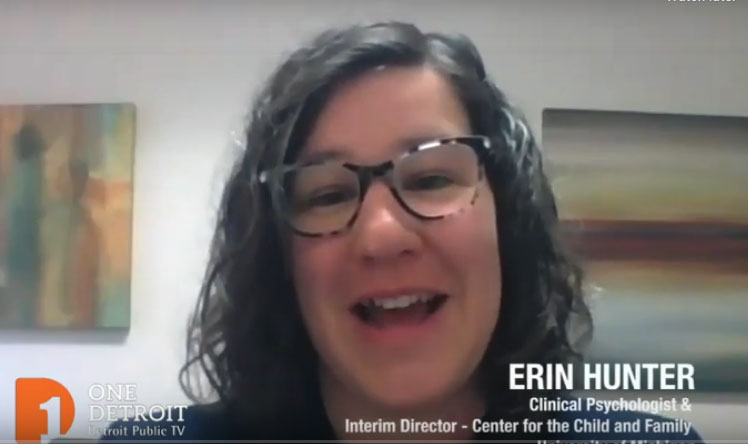UPDATE: Dr. Hunter did a follow up interview with PBS’s One Detroit on April 15, several weeks into the shelter-in-place order. The interview, featuring her tips and suggestions for staying mentally healthy as a family, can be seen here: Family Psychology in the Pandemic.
March Interview: Strategies for Dealing with the “New Normal” of COVID-19
How can I tell if my kids are having anxiety? How do I explain the pandemic to a toddler vs. a teen? How do I deal with my own stress when keeping my family calm? Dr. Erin Hunter, University Center for the Child and Family (UCCF) interim director and clinical psychologist with a specialty in children, teens, and families, addressed common anxieties on One Detroit PBS.
Dr. Hunter discussed how we’re all experiencing transitions personally and professionally at the moment, noting the transition of all MARI services to teletherapy methods, as well as the transition of family members spending more time in the home together.
Perfection Isn’t Realistic
Suddenly working from home, or dealing with the risk of going in to work or the uncertainty of not having a job can be a source of immense stress and pressure on all people, but can particularly for parents and other caregivers. They may be especially prone to trying to be perfect, while still juggling many different tasks and responsibilities. She recommended people lower their behavioral expectations, both of themselves and of their children. Dr. Hunter reminded viewers that, “perfect is not possible under the best of circumstances.”
Dr. Hunter also commented on how to best communicate with children about the pandemic: how much should they know, and how often should we be talking about it? She directed people to the MARI website, which provides resources for how to explain the coronavirus to children.
Coping and Silver Linings
Dr. Hunter noted that coping strategies and accentuating silver linings are important. She recommended doing just one thing at a time, rather than multitasking and becoming overwhelmed. It is also important to give yourself that space you need to breathe when things feel tough. She reminded viewers that “feelings are basically messages that our body is giving us that something is going on.” There are also silver linings to think about: getting more time to connecting with family, the chance to learn to use technology in a more balanced way, and the opportunity to play.
Dr. Hunter implored all to have compassion: for those in your own family; through social media; for those working for the good of society; and for yourself. We’re all doing our best when things are not easy.
Watch the Full Interview
The March 23 interview is available on the PBS website: One Detroit PBS Interview with Dr. Hunter.

